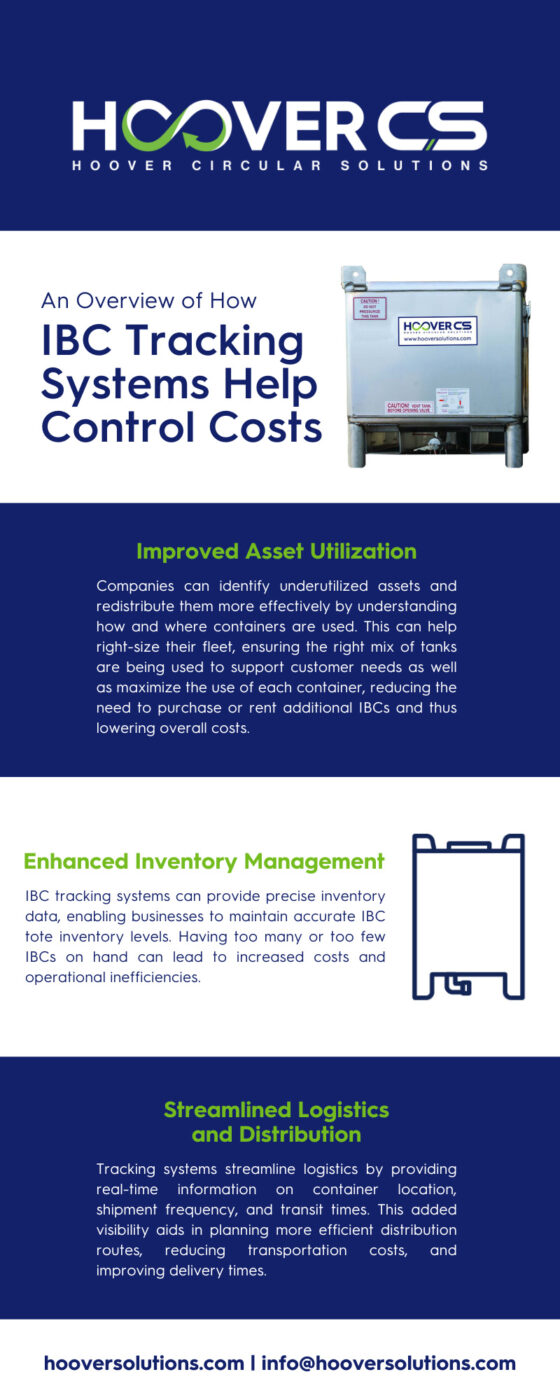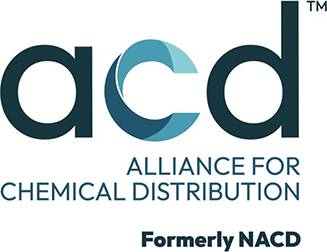As intermediate bulk containers continue to grow in popularity for the storage and transportation of liquids, chemicals, and other raw materials, IBC tracking systems have become pivotal in managing these tanks efficiently. These systems use technology to track and monitor IBC totes throughout the supply chain, offering numerous benefits in cost control and operational efficiency. Explore our overview of how IBC tracking systems help control costs.
The Basics of IBC Tracking
IBC tracking involves using technology such as RFID tags, GPS and cellular units, or barcodes to monitor the location and status of IBCs. This real-time data provides valuable insights into container movements and usage, transit times, storage conditions, and more. Businesses can make informed decisions to optimize their operations and reduce unnecessary costs when they have detailed fleet information at their fingertips.
Improved Asset Utilization
One of the primary ways IBC tracking helps control costs is through improved asset utilization. Companies can identify underutilized assets and redistribute them more effectively by understanding how and where containers are used. This can help right-size their fleet, ensuring the right mix of tanks are being used to support customer needs as well as maximize the use of each container, reducing the need to purchase or rent additional IBCs and thus lowering overall costs. Additionally, many distributors monitor “fleet turns”—defined as initial fill, delivery, and shipment cycle—as a primary measure of productivity. Monitoring the right fleet data from an IBC tracking system can ultimately increase turns, leading to increased revenue.
Enhanced Inventory Management
IBC tracking systems can provide precise inventory data, enabling businesses to maintain accurate IBC tote inventory levels. Having too many or too few IBCs on hand can lead to increased costs and operational inefficiencies. However, companies can avoid these pitfalls with asset tracking. This ensures inventory is readily available when needed, reduces unnecessary storage costs, and improves IBC management.
Streamlined Logistics and Distribution
Tracking systems streamline logistics by providing real-time information on container location, shipment frequency, and transit times. This added visibility aids in planning more efficient distribution routes, reducing transportation costs, and improving delivery times. Companies can adapt quickly to transit changes, which helps avoid delays and associated expenses.
Reduced Loss and Theft
IBC tracking systems significantly reduce the risk of tank loss and theft. It’s estimated that companies lose 8–10 percent of IBC tanks in their fleet each year, which can lead to significant costs depending on how large the fleet is. By constantly monitoring the location of containers, companies can quickly identify and respond to any unauthorized movements or discrepancies. This prevents financial loss due to stolen or lost containers and helps maintain the security of the materials within them.
Maintenance and Repair Tracking
Proper maintenance of IBCs is imperative for their longevity. Some tracking systems can be equipped to monitor the condition of containers and alert managers when maintenance such as reconditioning or repairs are needed. This proactive approach prevents minor issues from escalating into major problems, reducing long-term repair and replacement costs.
Enhanced Regulatory Compliance
Many industries have strict regulations regarding the transportation and storage of hazardous and non-hazardous liquids, chemicals, and other raw materials. IBC tracking systems ensure fleet compliance by providing accurate documentation, certificates, BOLs, and other important data on container usage and history. This reduces the risk of costly fines and legal issues arising from non-compliance.
Data-Driven Decision Making
The wealth of information provided by IBC tracking systems supports data-driven decision-making. Companies can identify areas for cost reduction and process improvement by analyzing trends and patterns. This strategic approach to fleet management can lead to significant and long-term cost savings.
Improved Customer Satisfaction
Safe, on-time, and efficient deliveries have a direct impact on customer satisfaction. IBC tracking ensures containers reach their final destinations as scheduled, enhancing service reliability. This not only fosters customer loyalty but can lead to recurring business opportunities and increased revenue.
Environmental Benefits
Efficient container usage and optimized logistics routes contribute to reduced carbon emissions, especially around Scope 3 emissions from chemical transport. IBC tracking systems promote environmental sustainability by minimizing unnecessary transportation and maximizing the use of each container. This visibility helps control costs and aligns with the growing need for eco-friendly business practices.
Minimizing Downtime
Efficiency in logistics is crucial, and minimizing downtime is a key component. IBC tracking systems significantly reduce delays by ensuring containers are available and in the right place at the right time. This efficiency reduces waiting times in production lines and delivery processes. Furthermore, by providing real-time data on container status, these systems enable quick decision-making, allowing immediate action in case of delays or stalled tanks. Minimizing downtime not only saves costs but also increases overall productivity, making the supply chain more robust and reliable.
Forecasting and Planning
Effective forecasting and planning are integral to cost control in logistics. IBC tracking systems provide valuable data that can be analyzed for trends and patterns, assisting in the accurate forecasting of container needs. This foresight allows businesses to efficiently allocate assets and plan budgets, avoiding over-investment in unused containers or last-minute scrambles for additional resources. With better forecasting, companies can prepare for peak periods more effectively, ensuring they have the right number of containers available at the right time, thus optimizing their investment and operations.
Reducing Administrative Burden
Manual tracking and management of IBCs is often labor-intensive and prone to errors. However, IBC tracking systems make this process easy through automation. From generating usage reports and delivery schedules to tracking container movements, these automated processes help reduce overhead and labor costs. Accuracy of data is another key benefit of automation, which is essential for analyzing fleet performance and determining ways to increase overall productivity.
Scalability and Flexibility
As businesses grow, their logistics can also change. IBC tracking systems offer the scalability and flexibility required to adapt to these changes. Whether a company needs to increase the size of their container fleet, expand to new geographical locations, or adjust to seasonal fluctuations, the right IBC tracking system should be able to scale accordingly. This adaptability ensures businesses can efficiently manage their growing or changing operations without having to invest in new systems or technology.
The Role of IBC Container Tracking in Cost Control
IBC container tracking is pivotal in cost control within logistics and supply chain management. By providing real-time visibility into the location, movements and status of every container, businesses can maximize their performance, reduce losses and theft, and ultimately improve operational efficiency. These systems also aid in regulatory compliance and reduce the risk of penalties.
Now that you have a general overview of how IBC tracking systems help control costs, we hope you have a clearer understanding of the important role IBC container tracking plays within your operations. Tracking and managing containers efficiently is a game-changer, enabling businesses to reduce expenses, improve service quality, and adapt to market changes. Investing in an IBC container tracking system is a strategic move for any business looking to streamline operations and maintain a competitive edge in today’s fast-paced market.




